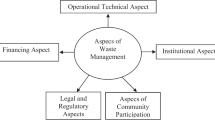Abstract
India generates 62 million tons of waste every year, of which 60% gets collected and only 15% processed. With the huge spike in urban population and shrinking spaces, it is imperative for an efficient waste management system. Unscientific waste disposal augments the emission of Greenhouse Gases like methane (6% in India). Waste to Energy plant is not viable in India due to the high concentration of organic content and inadequate segregation. Under such a situation, a Centralised treatment facility will not only culminate in irrevocable environmental and health hazards but further aggravate prevailing socio-political injustice in the country. The best possible alternative to this systemic hurdle is Decentralised Waste Management. This paper looks at two urban cities, Thiruvananthapuram and Bengaluru, where the former follows a decentralised waste management system and the latter centralised. The Waste Management system in Thiruvananthapuram city champions concepts of circular economy adopted by developed countries, which contest the unsustainable linear model. The city’s strategies adopted under Decentralised Waste Management are a catalyst towards achieving ‘no burn city’, an initiative against incineration and greenhouse gas emissions. The case studies of Bengaluru and Thiruvananthapuram city highlight the impact of systemic changes through progressive interventions towards the eradication of structural disparities. It analyses different aspects, the labour, the public, the governance and the environment in the context of waste management. The paper delves further into the question of welfare and beneficiary from state’s point of view. Through the system of Decentralised Waste Management, the paper advocates the importance of devolution of power and dissolution of responsibilities for a sustainable environment and an empowered and equitable society.
Access this chapter
Tax calculation will be finalised at checkout
Purchases are for personal use only
Similar content being viewed by others
Notes
- 1.
About 90% of Pourakarmikas are women and belong to Scheduled Caste.
- 2.
Kavitha Shankar vs BBMP and ors (ESG, 1995).
- 3.
The name of the organization and individuals are not revealed to maintain the anonymity clause ensured during interviews.
- 4.
The 2020 order for case WP 24739/2021 indicated building permission to 9188 application between 1st January 2019 to 31st January 2020.
References
Ahlheim, M., Becker, M., Trastl, H., & Losada, Y. A. (2019). Wasted! Resource recovery and waste management in Cuba. International Journal of Cuban Studies, 147–173.
Annepu, R. K. (2012). Sustainable solid waste management in India. http://www.seas.columbia.edu/earth/wtert/sofos/Sustainable%20Solid
Arya, U. R. (2017, August 12). The Times of India.https://timesofindia.indiatimes.com/city/kochi/your-garbage-your-responsibility-saysthiruvananthapuram/articleshow/60023376.cms.Narain. Accessed 31 March 2021.
Badlock, J., Mitton, L., Manning, N., & Vickerstaff, S. (2012). Social Policy. Oxford University Press.
Bauman, Z. (2013). Wasted lives: Modernity and its outcasts. John Wiley & Sons.
Baviskar, A., & Gidwani, V. (2019). The lives of waste and pollution. Economic and Political Weekly, 33–35.
BBMP. (2020). Bruhat Bengaluru Mahanagar Palike.. https://bbmp.gov.in/departmentwebsites/swm/index.html. Accessed 31 March 2021.
Bhalerao, S. (2019, March 26). Fire breaks out at Mumbai’s Deonar dumping ground, as temperature soars. Hindusthan Times. https://www.hindustantimes.com/mumbai-news/firebreaks-out-in-mumbai-s-deonar-dumping-ground-as-temperatures-soar/story-eca6OWCIbpm9VUYoK82c4I.html. Accessed 30 August 2019.
Bhat, P. (2019). What garbage burning does to Bengaluru: Asthma and heart attacks on the rise. https://www.thenewsminute.com/article/what-garbage-burning-does-bengaluru-asthma-and-heart-attacks-rise-88739. Posted on 21 September 2018. Accessed on 14 September 2019.
Bhuiyan, S. H. (2010). A crisis in governance: Urban soild waste management in Bangladesh. Habitat International, 125–133.
Bjerkli, C. L. (2013). Government on the ground: A study of solid waste management in Addis Ababa, Ethiopia. International Journal of Urban and Regional Research, 1273–1287.
D’Souza, R., & Nagendra, H. (2011). Changes in public commons as a consequence of urbanisation: The Agara Lake in Bangalore, India. Environment Management, 840–850.
Darokar, S. (2018). Manual scavengers: A blind spot in urban development discourse.
Das, S., Lee, S. H., Kumar, P., Kim, K. H., Lee, S. S., & Bhattacharya, S. S. (2019). Solid waste management: Scope and challenges of sustainability. Journal of Cleaner Production, 658–678.
Doron, A., & Jeffery, R. (2018). Waste of a nation: Garbage and growth in India. In I. A. Doron & R. Jeffery (Eds.), Growth and garbage (p. 43). Harvard University Press.
Environment Protection Agency. (2020, October). Retrieved from https://www.epa.gov/sites/production/files/2020-10/documents/master_swmg_10-20-20_0.pdf
Environment and Support Group. (2018). Bangalore’s toxic legacy Intensifie. Environment and Support Group.
Environment Support Group India (Bengaluru). (1995). https://esgindia.org/new/pils/swm-pils/esgsinitiatives-onsocially-just-and-ecologically-progressive-management-ofmunicipal-solid-waste-including-pils/. Accessed 30 April 2020.
Eriksen, T. H., & Schober, E. (2017). Waste and the superfluous: An introduction. Social Anthropology, 25(3), 282–287.
Fathima, I. (2020, February 22). New Indian Express. https://www.newindianexpress.com/cities/bengaluru/2020/feb/22/irregular-waste-collection-leaves-residents-in-a-fix-2106860.html. Accessed 27 April 2020.
Frosch, R. A., & Gallopoulos, N. E. (1989). Strategies for manufacturing. Scientific American, 261(3), 144–153. http://www.jstor.org/stable/24987406. Accessed 18 January 2021
Ghosh, A. (2020, August 13). The Print. https://theprint.in/india/indiaspopulation-to-cross-152-crore-in-next-16-years-more-people-will-be-of-working-age/481018/. Accessed 31 March 2021.
Grindle, M. S. (2010). Good governance: The inflation of an idea (HKS faculty research working paper series, RWP10–023, John F). Harvard University.
Gupta, S. K. (2012). Integrating the informal sector for improved waste management. Private Sector and Development, 15, 12–17.
Hoornweg, D., & Tata, P. B. (2012, March). What a waste: A global review of solid waste management. Retrieved from World Bank Group: https://openknowledge.worldbank.org/handle/10986/17388
Hui, Y., Li’ao, W., Fenwei, S., & Gang, H. (2006). Urban solid waste management in Chongquing: Challenges and opportunities. Waste Management, 1052–1062.
Isaac, T., & Harilal, K. N. (1997). Planning for empowerment: People’s campaign for decentralised planning in Kerala. Economic and Political Weekly, 53–58.
Isaac, T., & Tharakan, M. (1995). Kerala: Towards a New Agenda. Economic and Political Weekly 1993–2004.
Korhonen, J., Nuur, C., Feldmann, A., & Birkie, S. E. (2018). Circular economy as an essentially contested concept. Journal of Cleaner Production, 175, 544–552.
Korner, I., Sanchez, S. I., & Corrales, A. Y. (2008). Proposal for the integration of decentralised composting of the organic fraction of municipal soild waste into the waste management system of Cuba. Waste Management, 64–72.
Massoud, M. A., Mokbel, M., Alawieh, S., & Yassin, N. (2019). Towards improved governance for sustainable solid waste managemnt in Lebanon: Centralised vs decentralised approaches. Waste Management & Research, 686–697.
Metin, E., Erozturk, A., & Neyim, C. (2003). Solid waste management practices and review of recovery and recycling operations in Turkey. Waste Management, 425–432.
Narayana, T. (2009). Municipal solid waste management in India: From waste disposal to recovery of resources? Waste Management, 1163–1166.
Nilsson, M., Eklund, M., & Tyskeng, S. (2009). Environmental integration and policy implementation: Competing governance modes in waste management decision making. Environment and Planning, 1–18.
National Commission on Population. (2019, November). Reports. Retrieved from Ministry of Health and Wefare. https://nhm.gov.in/New_Updates_2018/Report_Population_Projection_2019.pdf
National Green Tribunal. (2021, February 2). Karnataka State Pollution Control Board. https://kspcb.karnataka.gov.in/sites/default/files/inlinefiles/2.2.21%20BBMP%20limit%20NGT%20SLC%20meeting%20proceedings.pdf. Accessed 25 March 2021.
Naveen, B. P., & Sivapullaiah, P. V. (2020). Solid waste management: Current scenario and challenges in Bengaluru. In Sustainable sewage sludge management and resource efficiency. IntechOpen.
Nzeadibe, T. C. (2009). Solid waste reforms and informal recycling in Enugu urban area, Nigeria. Habitat International, 93–99.
Ostrom, E. (2008). Institutions and the environment. Economic Affairs, 28(3), 24–31.
Owolabi, S. A., Mmereki, D., Baldwin, A., & Li, B. (2016). A comparative analysis of solid waste management in developed, developing and lesser developed countries. Environmental Technology Reviews, 120–141.
Praveen, R. S. (2020, February 17). Waste to energy plants not necessary (p. 2). The Hindu.
Pujara, Y., Pathak, P., Sharma, A., & Govani, J. (2019). Review on Indian municipal solid waste management practices for reduction of environmental impacts to acheieve suitable development goals. Journal of Environmental Management, 1–12.
Ramachandra, T. V., & Aithal, B. H. (2016). Bengaluru’s reality: Towards unlivable status with unplanned urban trajectory. Current Science, 110(12), 2207–2208.
Ramachandra, T. V., & Bachamada, S. (2007). Environmental audit of municipal solid waste management. International Journal for Environmental Technology and Management, 369–391.
Ramachandra, T. V., Bharath, H. A., Kulkarni, G., & Han, S. S. (2018). Municipal solid waste: Generation, composition and GHG emission in Bengalore, India. Renewable and Sustainable Energy Reviews, 1122–1136.
Ramani, C. V. (2018). Pourakarmikas still wait for service regularisation. The Hindu.
Sambhyal, S. S. (2016). Solid waste management in Indian cities. Centre for science and environment.
Sambyal, S. S. (2016). Swachh Bharat Mission—Performance in figures. https://www.downtoearth.org.in/feature/two-years-of-swachhbharat- mission-55883. Posted on 1 October 2016. Accessed on 29 April 2020.
Sambyal, Swati singh. (LinkedIn). https://www.LinkenIn.com/posts/swatisambhyal_thiruvananthapuramzerowaste-zerowaste-activity-6635471247696322560-EJLL. Accessed on 12 April 2020.
Shaban, A., Kourtit, K., & Nijkamp, P. (2020). India’s urban system: Sustainability and imbalanced growth of cities. Sustainability, 1–20.
Sharma, M. (2018, May 12). Bangalore Mirror. Retrieved January 5, 2021, from https://bangaloremirror.indiatimes.com/bangalore/cover-story/ec-data-reveals-citys-exponential-growth-there-are-now-over-1-25-crore-of-us-bengalureans/articleshow/64129198.cms
Singh, S. (2015). Cities- the 21st century India. In S. Singh (Ed.), Decentralised solid waste Management in India: A perspective on technological options (pp. 289–302). Bookwell Publishers.
Swaminathan, M. (2018). How can India’s waste problem see a systemic change. Economic and Political Weekly Engage. https://www.epw.in/engage/article/institutional-framework-implementingsolid-waste-management-india-macro-analysis. Accessed 28 August 2019.
The Hindu. (2020, December 3). https://www.thehindu.com/news/cities/bangalore/state-to-get-waste-to-energy-plant-in-2022/article33234145.ece#:~:text=State%20to%20get%20waste%2Dto%2Denergy%20plant%20in%202022,-Staff%20Reporter&text=Yediyurappa%20on%20Wednesday%20laid%20the,WtE%20plant%2. Accessed 20 March 2021.
Tiwari, D. (2021, January 2). Deccan Herald. https://www.deccanherald.com/specials/point-blank/fixing-bengalurus-waste-management-issues-beyond-activism-934212.html. Accessed 20 March 2021.
TMC (Thiruvananthapuram Municipal Corporation). (2019). Status of solid and liquid waste management. Thiruvananthapuram Municipal Corporation.
US Census Bureau. (2021, January 18). United States Census Bureau. https://www.census.gov/popclock/print.php?component=counter. Accessed 31 March 2021.
Vujic, G., Roof, A. G., Stanisavljevic, N., & Ragossnig, A. (2015). Municipal solid waste developement phases: Evidence from EU27. Waste Management & Research, 1112–1120.
Wilson, D. C., Rogero, A. C., Modak, P., Velis, C., Rodic, L., Soos, R.,... Iyer, M. (2015). Global Waste Management Outlook. Retrieved from United Nations Environment Programme: https://www.unep.org/resources/report/global-waste-management-outlook
Zhang, D. Q., Tan, S. K., & Gersberg, R. M. (2010). Municipal soild waste management in China: Status,problems and challenges. Journal of Environmental Management, 1623–1633.
Zurbrugg, C., Drescher, S., Patel, A., & Sharatchandra, H. C. (2004). Decentralised composting of urban waste- An overview of community and private initiatives in India. Waste Management, 655–662.
Zurbrugg, C., Drescher, S., Rytz, I., Sinha, A. M., & Enayetullah, I. (2005). Decentralised composting in Bangladesh, a win-win situation for all stakeholders. Resources, Conservation and Recycling, 281–292.
Author information
Authors and Affiliations
Editor information
Editors and Affiliations
Rights and permissions
Copyright information
© 2022 The Author(s), under exclusive license to Springer Nature Singapore Pte Ltd.
About this chapter
Cite this chapter
Madhukumar, N. (2022). Decentralised Urban Waste Management: A Case Study of Solid Waste Management in Two Indian Cities - Thiruvananthapuram and Bengaluru. In: Chaiechi, T., Wood, J. (eds) Community Empowerment, Sustainable Cities, and Transformative Economies. Springer, Singapore. https://doi.org/10.1007/978-981-16-5260-8_14
Download citation
DOI: https://doi.org/10.1007/978-981-16-5260-8_14
Published:
Publisher Name: Springer, Singapore
Print ISBN: 978-981-16-5259-2
Online ISBN: 978-981-16-5260-8
eBook Packages: Economics and FinanceEconomics and Finance (R0)




